Artificial Intelligence (AI) is no longer a futuristic concept—it’s an integral part of our daily lives, transforming industries, economies, and society as a whole. As AI technology continues to advance at a rapid pace, many are left wondering: what does the future hold for humanity in an age dominated by AI? Will AI serve as a tool for human advancement, or will it pose risks that we must learn to manage?
In this article, we’ll explore the transformative potential of AI, the opportunities and challenges it brings to the future of humanity, and how we can ensure that AI serves our collective interests. From its impact on jobs to ethical considerations, AI is set to shape the trajectory of human civilization for generations to come.
The Rise of Artificial Intelligence: A Brief Overview
Artificial Intelligence refers to the simulation of human intelligence processes by machines, especially computer systems. These processes include learning (the ability to improve performance based on experience), reasoning (the ability to make decisions and solve problems), and self-correction.
AI is already integrated into everyday life, from voice assistants like Siri and Alexa to recommendation algorithms on Netflix and Amazon. But AI’s influence extends far beyond personal convenience. In industries like healthcare, finance, transportation, and manufacturing, AI is driving innovations that were once considered science fiction.
The Current State of AI Technology
Today’s AI is mostly categorized as narrow AI, or weak AI, which is designed to perform specific tasks—such as language translation, facial recognition, or playing chess—without possessing general cognitive abilities. While narrow AI is impressive in its ability to perform these tasks at superhuman levels, it lacks the adaptability and versatility of human intelligence.
However, general AI—an AI system that can perform any intellectual task that a human can—remains the ultimate goal for many researchers. If achieved, general AI could revolutionize industries and solve complex global problems, but it also raises profound questions about the role of humans in a world with machines capable of independent thought and decision-making.
The Potential Impact of AI on Human Life
1. AI and Job Automation: A Double-Edged Sword
One of the most talked-about concerns surrounding AI is its potential impact on employment. As AI systems become more sophisticated, many jobs, particularly those that involve repetitive tasks, are at risk of being automated. Manufacturing, transportation, and customer service industries are already experiencing the effects of AI-driven automation.
However, while some jobs may be lost, AI could also create new job opportunities, particularly in fields related to AI development, maintenance, and management. For example, AI ethics experts, machine learning engineers, and data scientists are in increasing demand.
The key challenge will be ensuring that workers who are displaced by AI can transition into new roles, particularly through reskilling and education programs. In this way, AI may act as a catalyst for the evolution of the workforce, rather than merely a job killer.
2. AI in Healthcare: Transforming Medicine
AI’s potential to revolutionize healthcare is nothing short of remarkable. From AI-powered diagnostic tools to robot-assisted surgery, the technology has the power to improve patient outcomes, reduce costs, and increase the efficiency of healthcare systems.
- AI in Diagnostics: Machine learning algorithms can analyze medical data, such as X-rays, MRIs, and genetic information, to detect diseases like cancer, heart disease, and neurological disorders with greater accuracy than human doctors alone.
- Personalized Medicine: AI can tailor treatment plans to individual patients based on their genetic makeup, lifestyle, and medical history, paving the way for precision medicine.
- Drug Discovery: AI accelerates drug discovery by analyzing vast amounts of data to identify promising compounds and predict their effectiveness, reducing the time it takes to bring new drugs to market.
While AI promises to improve healthcare, it also raises ethical issues surrounding privacy, data security, and the potential for algorithmic bias.
3. AI in Transportation: The Era of Autonomous Vehicles
Self-driving cars are one of the most high-profile examples of AI in action. Autonomous vehicles, powered by AI, promise to revolutionize transportation, making roads safer, reducing traffic congestion, and lowering carbon emissions. In addition to cars, AI is also being applied to drones and trains for efficient, autonomous transportation systems.
The widespread adoption of autonomous vehicles will have significant societal impacts:
- Job Displacement: Professions like trucking, delivery driving, and taxi services could be disrupted by the rise of self-driving cars.
- Urban Planning: With fewer cars on the road and more efficient transportation systems, cities may undergo significant transformations, with less need for parking spaces and more emphasis on sustainable urban development.
However, questions around safety, ethical decision-making in emergency situations, and liability in case of accidents remain a challenge for the widespread adoption of autonomous vehicles.
4. AI and Ethics: Ensuring Responsible Development
As AI continues to evolve, so too does the conversation about its ethical implications. Ensuring that AI is developed and used responsibly is essential for minimizing risks and maximizing its potential benefits. Key ethical considerations include:
- Bias and Fairness: AI algorithms can inherit biases from the data they are trained on, leading to discriminatory outcomes. For instance, facial recognition systems have been found to have higher error rates for people of color, raising concerns about their use in surveillance and law enforcement.
- Privacy: AI relies on vast amounts of data, much of which is personal. Balancing the benefits of AI with the need to protect individual privacy is a critical challenge.
- Transparency: As AI systems become more complex, understanding how they make decisions becomes increasingly difficult. This lack of transparency raises concerns about accountability, especially in high-stakes areas like healthcare and criminal justice.
To address these challenges, governments, organizations, and researchers must collaborate to create ethical frameworks and guidelines that prioritize human well-being while fostering innovation.
The Future of Human-AI Collaboration
Despite the challenges, AI holds immense potential for positive societal impact. Rather than seeing AI as a threat to humanity, many experts believe the future of AI lies in collaboration between humans and machines. Some key areas where AI can complement human abilities include:
- Creativity: AI can assist in creative fields such as art, music, and writing by generating new ideas or helping humans refine their own work. AI-powered tools like OpenAI’s GPT-3 are already being used for content creation and problem-solving.
- Education: AI-powered tutoring systems can provide personalized learning experiences, adapting to individual students’ needs and helping them learn more efficiently.
- Climate Change: AI can help address global challenges like climate change by optimizing energy consumption, improving agricultural practices, and predicting natural disasters.
By leveraging AI as a tool to enhance human capabilities, we can unlock new possibilities in science, technology, and even human flourishing.
FAQs: Artificial Intelligence and the Future of Humans
1. How will AI affect the job market?
AI will likely lead to both job displacement and the creation of new roles. While some jobs may be automated, AI will also create demand for AI specialists, data scientists, and ethics consultants. It’s essential to focus on reskilling and education to help workers adapt to these changes.
2. Will AI ever surpass human intelligence?
AI has already surpassed human capabilities in specific tasks, such as playing chess or analyzing large datasets. However, achieving Artificial General Intelligence (AGI)—an AI that can perform any intellectual task that a human can—remains a long-term goal. Whether AI will ever truly surpass human intelligence in all areas is a subject of ongoing debate.
3. Is AI safe for healthcare?
AI has the potential to greatly improve healthcare, but it also raises concerns about data security, privacy, and algorithmic bias. It’s crucial that AI systems used in healthcare are thoroughly tested and that safeguards are in place to protect patient data.
4. What ethical concerns does AI raise?
Some of the key ethical concerns surrounding AI include bias and discrimination, privacy issues, lack of transparency, and the potential for job displacement. Responsible AI development requires strict guidelines and oversight to ensure that AI benefits humanity while minimizing harm.
5. How can AI help solve global challenges?
AI has the potential to address global challenges like climate change, poverty, and disease by optimizing resources, predicting disasters, and improving healthcare outcomes. For example, AI-powered systems can help monitor environmental changes, develop renewable energy solutions, and personalize treatment plans for patients.
Conclusion: Embracing the Future with Caution
AI is poised to revolutionize many aspects of human life, offering unprecedented opportunities for progress and innovation. However, its rapid development comes with significant challenges, including ethical concerns, job displacement, and safety risks. The future of humans and AI is not one of competition but of collaboration, where both can complement each other’s strengths.
As we move forward into this new era, it’s essential to prioritize ethical AI development, focus on reskilling the workforce, and ensure that the benefits of AI are accessible to all. By doing so, we can harness the full potential of AI while safeguarding human interests and ensuring a prosperous and equitable future.


